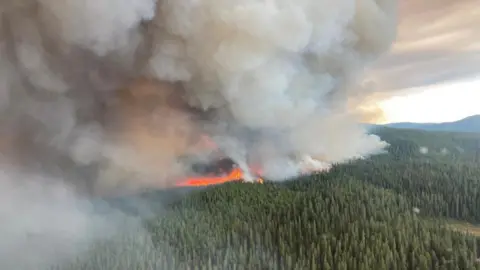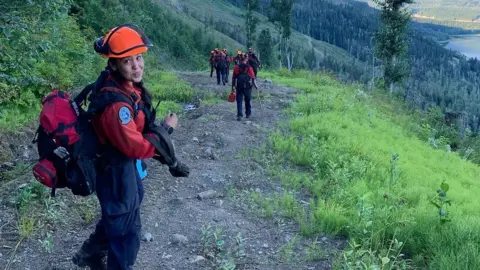Canada wildfires: Second firefighter dies amid record blazes
 Reuters
ReutersA second firefighter has been killed in Canada as the country battles its worst season of wildfires on record.
The person, who has not yet been named, died from injuries sustained while fighting a fire near Fort Liard in the Northwest Territories on Saturday.
It comes just days after 19-year-old Devyn Gale was killed while working in neighbouring British Columbia.
Nearly 900 wildfires are currently burning across Canada, about 580 of which remain out of control.
So far this season, the fires have burned more than 10m hectares (24.7m acres) of land, according to the Canadian Interagency Forest Fire Centre.
The figure is higher than for any previous year on record and more than three times the average for the previous 10 years.
On Sunday, Prime Minister Justin Trudeau said he was "incredibly saddened" by the news that a second firefighter had lost their life, and sent his condolences to their family.
Caroline Cochrane, premier of the Northwest Territories, said the death was a "tragic loss for the entire territory".
"I extend my heartfelt condolences to their family, friends and colleagues," she said.
"The bravery and selflessness of our firefighters is an incredible gift to us all. Thank you for your service to our territory and to our country."
Ms Gale's death was the first death on the ground since the start of Canada's wildfire season - and reportedly the first in British Columbia since 2015.
Afterwards, Mr Trudeau said Canadians "must never forget the risks these heroes take every time they run toward the danger".
"To firefighters... across the country who are doing just that to keep us safe: Thank you. We are inspired by your courage, and grateful for your service," he said.
Climate change increases the risk of the hot, dry weather that is likely to fuel wildfires. The world has already warmed by about 1.1C since the industrial era began and temperatures will keep rising unless governments around the world make steep cuts to emissions.
Canada is estimated to be warming twice as fast as the rest of the world and in recent years has seen extreme weather events of increasing frequency and intensity.
The wildfires have also sparked pollution alerts across North America as smoke is blown south along the continent's eastern coast.
 Nolan Gale/Instagram
Nolan Gale/Instagram